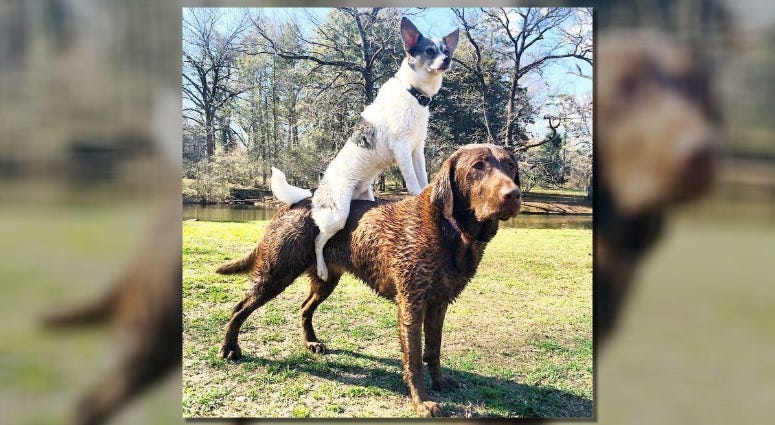
She was also increasingly troubled by how much time her dog was spending alone while she was out cooking for others.
It was time to find work that could address both concerns.
On a visit to upstate New York a few years ago, she had her “Eureka!” moment when she stopped at a fish-cleaning station, hoping to pick up some salmon filets from local fishermen to take back home to Germantown.
But what she picked up was the inspiration for her new business.
RELATED: Dogs' raw meat diet could be dangerous to them and owners, study says
“They told me it’s illegal to sell fish caught by sport fishing,” Kirby said at her busy booth at the Philadelphia Flower Show.
So no filets for her.
“But I saw them tossing the skins into 55-gallon buckets and asked what would happen to them, and they said they pay someone to haul them away to a landfill.”
Not one to waste a trip or viable food scraps, Kirby learned there’s no law against giving an interested tourist a bucket of fish skins, so she hauled some home to try her hand at dehydrating them into a treat for her own pups — Candy, an attractive chocolate Lab, and her bestie, Darwin, a Chihuahua/rat terrier mix.
Over the next few years, she experimented, tweaked her technique and taste-tested it on friends’ pets while delighting the New York fishermen, who happily froze the wild-caught salmon skins for her in between her visits.
RELATED: K-9s help detect explosives, speed up screening time at airports
She researched, traveled, talked to farmers and growers, and created more pet treats from “rescued” ingredients.
And then, Piggyback Treats Company was born.
“I realized it can be sustainable, I can ‘piggyback’ with other businesses that have food waste — usable, human-grade byproducts that humans just don’t choose to eat,” Kirby enthused. “We partner with small family cattle farms now for products that go into our treats that otherwise would be thrown away. We travel up to five hours in any direction and buy heart, tongue, liver, kidney, backstraps, oxtails — really anything the farmer asks, ‘Can you use this?’ And that gives me a lot of ideas for new products, too.”
A chat with a pumpkin farmer after Halloween resulted in three different treats from the dented, misshapen gourds that would have rotted in his field: a gluten-free baked pumpkin bone biscuit; liver-coated, toasted pumpkin seeds, which were soaked in the blood from thawed liver (even that doesn’t just go down the drain); and dehydrated strips of pure pumpkin, which Kirby said are a high-fiber treat that’s particularly craved by pets with digestive issues.
These goodies and others she makes definitely don’t follow the trend of pet treats imitating human food — no cupcakes (pupcakes?) or frosted cookies here.
RELATED: App has users swiping right to help adoptable animals find forever homes
The salmon jerky looks like desiccated fish skins, scales intact; the brown anise-liver bier bones made with spent beer grains from a local brewer are a typical dog-bone shape.
Kirby doesn’t add colorants and avoids all extra flavorings or preservatives.
“They’re all just dehydrated and baked, and even after we bake our treats, we finish them in the dehydrator so that they have a longer shelf life.”
A new report from the Pet Sustainability Coalition and World Pet Association on trends in sustainability for the pet food market found 91 percent of respondents expect demand for sustainable, socially conscious pet food companies to increase over the next five years.
Trying to stay well ahead of that curve, Piggyback Treats even uses compostable packaging and labeling whenever possible.
While there are plenty of ways to reduce your pet’s carbon paw print, buying a dehydrator and drying out the giblets from the Thanksgiving turkey isn’t for every pet owner, though Kirby said those are just some of the scraps from our everyday supermarket trips that we often discard instead of sharing with our grateful fur-babies.
Check with your animal’s health provider to see what its diet can bear. In Kirby’s kitchen, Candy and Darwin get broccoli stalks, the tops and bottoms of zucchini, carrot peels, and yes, even those fish skins from the humans’ salmon dinner.
“It’s good for them,” Kirby said. “It’s loaded with protein and omega-3s. Just make sure you don’t season or marinate it before you cook it for the pets.”
